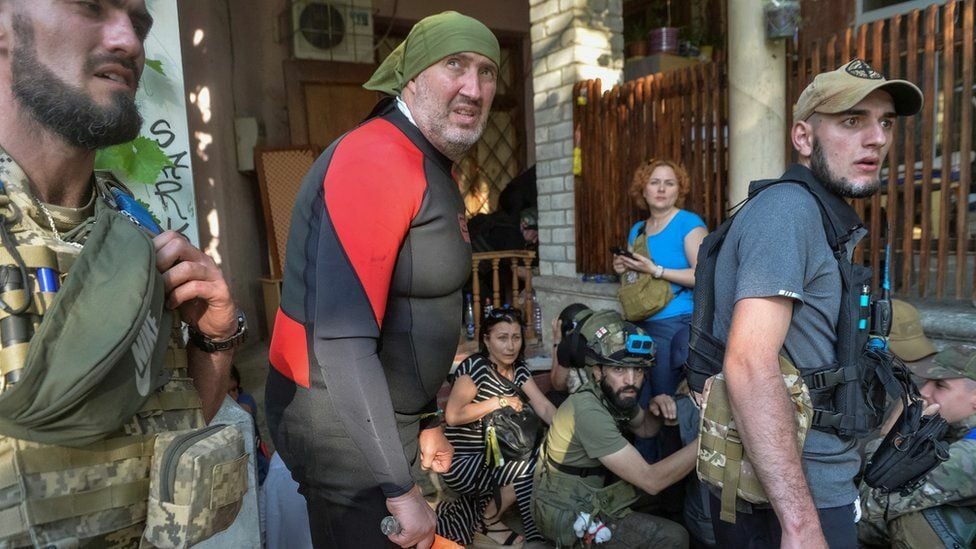Russia attacks evacuee boat in Kherson, kills three, amid dam flooding crisis

Three individuals lost their lives after a boat evacuating people from a flood-stricken area in Kherson, Ukraine, was attacked by Russian forces, according to the regional governor. The Nova Kakhovka dam, located on the eastern bank of the Dnipro River, was destroyed, causing widespread flooding and trapping numerous people. The governor, Oleksandr Prokudin, reported that Russian troops shelled the evacuation boat, killing a 74-year-old man who was attempting to rescue a woman from gunfire. Two police officers were also injured during the incident.
The Nova Kakhovka dam burst on Tuesday, causing a massive torrent of water to flood vast areas of land on both sides of the Dnipro river. Ukraine has accused Russia of “blowing up” the dam, which is situated in a Russian-controlled area of Ukraine. Russia has denied these allegations and instead blamed Ukraine for the dam’s destruction. The BBC has not been able to verify either claim.
The eastern bank of the Dnipro River has been severely affected by the flooding, with hundreds of people requesting rescue via the Telegram app. Ukraine’s military claims it has been coordinating rescue efforts from the eastern bank, but some evacuations are being carried out by “fearless volunteers.” One volunteer, Viktor, told the BBC that he came under Russian fire during a rescue attempt, suggesting that Russian soldiers were targeting volunteers and soldiers involved in the rescue efforts.
While the flooded area in Kherson has begun to recede, officials and experts are concerned about the potential spread of infectious diseases due to polluted waters. Thousands of Ukrainian homes are still flooded, and tens of thousands of people have lost access to drinking water. The Kakhovka reservoir, a crucial water source for the region, has also been drained.
Dr. Jarno Habicht, the World Health Organization (WHO)’s Ukraine representative, described the situation as “devastating” and stressed the importance of providing safe, clean water. He also highlighted the need to monitor water-borne illnesses and noted that precautionary sample testing is ongoing. The UK’s defence ministry has warned of a “sanitation crisis” in the region, with limited access to safe water and an increased risk of water-borne diseases.
In Kherson, located approximately 100km (62 miles) from the Kakhovka dam and heavily affected by the floods, restrictions on the use of river water have been introduced to prevent the spread of diseases. The flooding of houses and sewage facilities has led to significant water pollution, with the city military administration prohibiting bathing, fishing, and drinking the water, as well as providing it to animals.
Ukraine’s interior ministry reported that 32 settlements in Ukrainian-controlled Kherson have been flooded, along with 14 in the Russian-controlled part. Additionally, 31 settlements were flooded in the Mykolayiv region. The destruction of the Kakhovka dam has likely disrupted water supplies to Crimea, which was illegally annexed by Russia in 2014. The North Crimean Canal, which draws its water supply from the Kakhovka reservoir, is now at risk of running dry.
Ukrainian hydro energy company Ukrhydroenergo stated that the reservoir’s water level has fallen by over 7m (23ft), and the UK defence ministry warned that “water will soon stop flowing” to the peninsula. The person or persons responsible for the destruction of the Kakhovka dam would have been aware that it would deprive Crimea of much-needed fresh water.
On Saturday, Ukrainian President Volodymyr Zelensky confirmed that the country’s long-awaited counter-offensive against Russia had begun. Ukrainian troops have reportedly advanced in the east near Bakhmut and in the south near Zaporizhzhia, and have conducted long-range strikes on Russian targets. On Sunday, Ukraine announced the capture of three villages in the southeast, marking the first liberations of the counter-offensive.
Latest Thailand News
Follow The Thaiger on Google News:


























